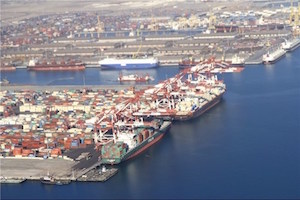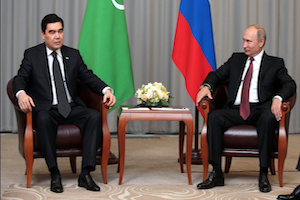Iran's Chabahar Port Empowers India-Afghanistan Trade at Pakistan's Expense
By Sudha Ramachandran
January 10, 2018, the CACI Analyst
On November 11, a consignment of 15,000 tons of wheat arrived in Afghanistan from India via Iran’s Chabahar port. This is an important milestone for the three countries as it marks the operationalization of the transit trade agreement they signed in 2017. In addition, the first phase of the development of Chabahar port has been completed. It is expected to energize Iran’s economy and provide India with a gateway for overland access to Afghanistan and the Central Asian states. Importantly, landlocked Afghanistan now has another outlet to the sea, reducing its dependence on Pakistani ports. This will reduce Islamabad’s influence over Afghanistan.

Turkmenistan's Gas Export Dilemma
By Dmitry Shlapentokh
November 15, 2017, the CACI Analyst
At first glance, Turkmenistan’s decision in January 2017 to stop selling gas to Iran was a minor episode in the context of an otherwise friendly relationship between Tehran and Ashgabat, as indicated by several meetings of high Iranian and Turkmen officials following the clash over gas deliveries. However, the tension with Iran could imply serious problems for Turkmenistan and lead to increasing dependence on Beijing, regardless of all Ashgabat’s maneuvering. Turkmenistan’s fallout with Iran also limits the ability of both the West and the South to access Central Asian gas and facilitates an increasing Chinese influence in this part of Eurasia, providing additional opportunities for China’s resurrection of the Silk Road.

Advancing Georgian-U.S. security cooperation after the Trump transition
By Richard Weitz
January 19th 2017, the CACI Analyst
The Trump administration will soon undertake a comprehensive review of Russia-US relations and U.S. policy toward the rest of Eurasia. Although the new team will presumably consider many options, the president-elect’s statements imply that the U.S. will not soon support further NATO expansion or other actions that would strongly antagonize Moscow. Despite this limitation, the U.S. government will continue security ties with U.S. partners in Eurasia, such as Georgia. In practice, there are a number of steps the U.S. and Georgia can undertake to advance their mutual security.
New signs of Chinese military interest in Central Asia
By Stephen Blank
January 16th, 2017, The CACI Analyst
Recent evidence shows a gradual increase in Chinese military activity in Central Asia, particularly with Tajikistan, Afghanistan, and Pakistan, although China has for years denied any military interest in the region. In October, PLA and Tajik forces jointly participated in counterterrorism exercises in Tajikistan near the border with Afghanistan, following earlier activity in 2016. Whereas Tajikistan was then silent, this time it publicized the exercises, which aroused a visible anxiety in the Russian media although the Russian government has hitherto been unwilling to comment on this issue. China’s initiative could imply a major new development in Chinese policy and in Central Asia’s overall security, with lasting implications for the region.
Russian intervention in Syria and the Caucasus
By Stephen Blank
November 27th, 2016, The CACI Analyst
Few people think about trends in the Caucasus with reference to or in the context of Russia’s Syrian intervention. But Moscow does not make this mistake. From the beginning, Moscow has highlighted its access to the Caucasus through overflight rights and deployment of its forces in regard to Syria, e.g. sending Kalibr cruise missiles from ships stationed in the Caspian Sea to bomb Syria. Therefore we should emulate Russia’s example and seriously assess military trends in the Caucasus in that Syrian context.








 Book S. Frederick Starr and Svante E. Cornell,
Book S. Frederick Starr and Svante E. Cornell,